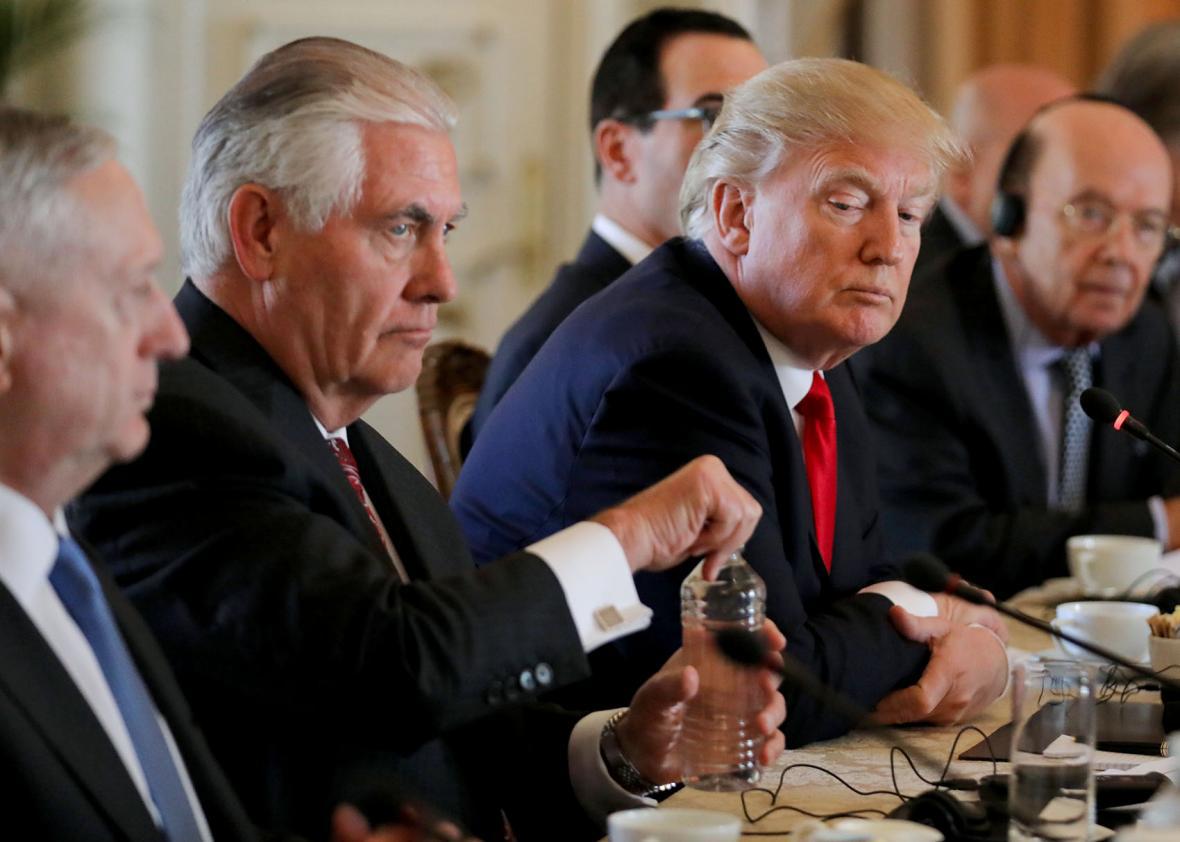President Trump will announce his decision on whether to isolate the United States by breaking our commitment to the Paris climate change agreement. He announced his plans via Twitter over the weekend and reiterated them Wednesday morning. According to Axios, he has already decided to withdraw and is only still contemplating whether he will do so via the formal, and yearslong process, or by pulling out of the entire United Nations treaty on climate change, a faster option.
Before he makes a final decision, the president might want to reread some recent political history. Sometimes presidencies rise or fall based on whom they listen to and the advice they choose to take. If he goes through with the withdrawal, Trump will have ignored the advice of many of his Cabinet members with the most experience in government and diplomacy.
Consider that President George W. Bush is remembered for following the neocons Dick Cheney and Donald Rumsfeld down an ideological rabbit hole of invading Iraq. Less remembered but still significant is his decision in the second term to marginalize Cheney—and empower a new set of foreign policy advisers, who helped him forge a legacy on diplomacy and development.
We hope President Trump will take a page from the Bush presidency and sideline the ideologues in favor of the experts. By siding with his Cabinet’s “globalists” over the Steve Bannon–led disruptors, Trump has a chance to restore some of the standing he haplessly eroded while tripping over himself on his first “overseas trip.”
There are many reasons why the Paris accord is important. Mostly it matters because our planet is currently on a collision course with Mother Nature, but we don’t expect this argument to resonate with the president. We do believe, however, that he wants to sustain America’s economic growth and to see the United States—not China—listened to and respected by partners and allies around the world. Last week, our closest allies—the G-7—used this rationale to pressure the president not to withdraw the United States from the Paris Agreement. It’s not clear if they had an impact.
But if he won’t listen to foreign leaders, we hope that three important members of his Cabinet will win the day with the economic and security arguments that, among the president’s advisers, they are best positioned to make.
Secretary of State Rex Tillerson, a former CEO of Exxon, could tell Trump that his former company supports the Paris accords, as do other major oil and gas companies, which long ago decided that low-carbon energy is in their business interests. Tillerson could also tell Trump that the Paris accords, signed by 190 nations, represent not just a stunning global achievement led by the United States but a test of our ability to keep our word. If the United States backs out of the agreement, the Chinese will fill the void. Additionally, as chief diplomat, Secretary Tillerson could also find a way in by arguing that while the president may want to downgrade other issues to achieve a unitary focus on fighting terror, our allies will work with us far less comfortably if we eviscerate a hard-fought global agreement on one of their top-tier priorities.
Secretary of Commerce Wilbur Ross could remind his boss that right after the election, more than 600 businesses and investors signed a letter urging the president-elect to fight climate change, stating that “Failure to build a low-carbon economy puts American prosperity at risk.” Secretary Ross could also highlight the scientific analysis from National Oceanic and Atmospheric Administration, an agency within the Department of Commerce, that found average surface temperatures to be 0.07 degrees Fahrenheit warmer than the year before. The report featured eight successive months that were individually the warmest since 1880.
And finally Secretary of Defense James Mattis could inform the president of a 2014 report from the CNA Military Advisory Board that concluded that climate change in the Middle East and Africa is leading to conflicts over food and water and escalating longstanding regional and ethnic tensions. Secretary Mattis could also point to the 2014 Quadrennial Defense Review, the Pentagon’s most recent strategic planning document, which drew a direct link between the effects of global warming and terrorism, stating that rising sea levels and extreme weather “are threat multipliers,” contributing to “conditions that can enable terrorist activity and other forms of violence.” He could do this by simply repeating the testimony that he gave in his confirmation hearing in January, when the revered Marine general stated, “Climate change can be a driver of instability.”
The decision about whether to uphold the Paris accords is an important test, not only for President Trump, but for the heavyweights in his Cabinet. Do they mean what they’ve said for years about the intersection of climate change with economic and military security? If they do, are they willing to stand up to the president and make the argument? And will the president listen?
